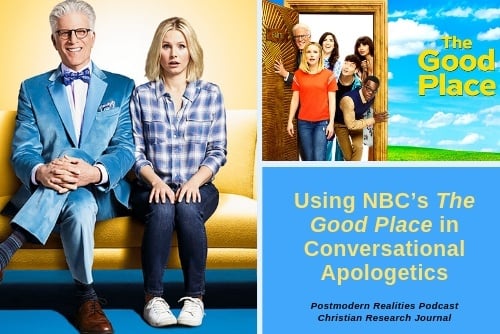NBC’s The Good Place television series has had three hilarious yet thought-provoking seasons (its final and fourth season begins Sept. 26, 2019) which tell a riveting story while examining crucial philosophical questions such as what it means to live a good life and whether we have any moral obligations to our fellow man. Along the way, viewers have been exposed to the ideas of several major figures of Western philosophy such as Aristotle, Kant, Kierkegaard, Hume, Mill, and Sartre, as well as a few contemporary thinkers such as Todd May, the Clemson University philosopher who serves as one of the show’s consultants. In addition to its value as a fun pedagogical tool, The Good Place has turned out to be a rich resource for apologetics; many elements of the storyline and character dialogue can be used in conversations about human nature, objective morality, and why the exclusion of God results in a failure to make sense of things in an intellectually satisfying way.
This Postmodern Realities episode is a conversation with Journal author Melissa Cain Travis about her online-exclusive review “Using NBC’s The Good Place in Conversational Apologetics”.
We’d also like to invite you to subscribe to the Journal. To subscribe to the Journal, please click here.
When you to subscribe to the Journal, you join the team of print subscribers whose paid subscriptions help provide the resources at equip.org that minister to people worldwide. These resources include our free online-exclusive articles, such as this review, as well as our free Postmodern Realities podcast.
Another way you can support keeping our resources free is by leaving us a tip. A tip is just a small amount, like $3 or $5, which is the cost for some of a latte, lunch out, or coffee drink. To leave a tip, click here.
Other articles and podcasts featuring this author:
Hank Unplugged Women in Apologetics with Melissa Cain-Travis
Episode 037: Choose Your Own Enchantment: Freedom and Conscience in What We Watch
“Choose Your Own Enchantment: Freedom and Conscience in What We Watch
Television as the New Literature: Understanding and Evaluating the Medium
The Artistic Pro-Life Theme in Netflix’s I Am Mother
Postmodern Realities Episode 132: The Artistic Pro-Life Theme in Netflix’s I Am Mother
Motherhood and the Life of the Mind
Postmodern Realities Episode 002: Motherhood and the Life of the Mind
Postmodern Realities Episode 095 Virtue, Human Nature, and the Quest for Happiness
Virtue, Human Nature, and the Quest for Happiness
What the Size of the Cosmos Doesn’t Say about Mankind
A Wrinkle in Time: Drawing Apologetic Value from a De-Christianized Film
